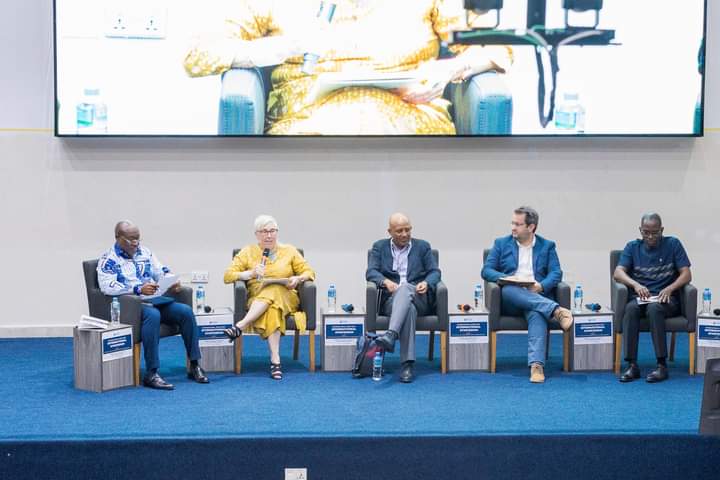The University of Ghana’s International Programme Office has successfully held the 2024 International Week, dubbed #iweek, on the theme “Global Connectivity: Celebrating International Diversity and Exchanges.”
The celebration was a 3-day programme from May 22 to May 25, 2024, which included a symposium, a fair and a food bazaar.
The symposium, titled ‘Rethinking Internationalisation in Africa: The Equity Question,’ was held on 23rd May at the Cedi Conference Centre, featuring a keynote address by Emeritus Prof. Hans de Wit of Boston College where he urged African universities to rethink their approach to internationalization.
He pointed out its (internationalization) elitist nature in the continent, noting that only a small percentage of students from Africa get the opportunity to study abroad.
“We know that internationalization is a very elitist dimension. It’s elitist in many aspects, in the aspects of the number of international students [in Africa] that is a very small percentage of students that have the opportunity to do that. Worldwide. Only 1% of the student population in the world has had the opportunity to go abroad and in Africa is even far less than the 1%… only a few institutions in the global world primarily are having the possibility and even are taking the initiative to recruit international students.”
He urged African universities not to simply copy the global north’s model but to tailor internationalization to the specific needs of African societies and institutions.
“So, internationalization [does not have] a model that fits all. It is defined by the context, the local context of your institution, the local context of your country, and then the context of your region. And you have to apply it to that context and to see what is relevant.”
As one of the keynote speakers at the symposium, Prof. Birgit Munch, Vice-Rector for International Affairs at the University of Bonn, highlighted the enduring challenges that universities face in their efforts to nurture international partnerships. She pinpointed the origin of these challenges, attributing them to national laws and regulations enforced by governing organizations.
“We struggling with administrative hurdles such as travel restrictions or the inability to transfer funds abroad us is why we are continuously looking for solutions and keeping up the conversation to improve. Such circumstances mainly are not rooted in the administrative structure of our university but are based on national law and regulations implemented by handling organizations. As universities, we can neither change national law nor can we change regulations issued by third-party funding providers.”
Prof. Munch emphasized that collaborative efforts and the exchange of ideas are crucial for addressing common challenges and improving global circumstances. She highlighted the importance of forums as platforms for universities to collectively identify ways to enhance conditions and advance equity.
“Without globally network universities, no university will be able to be successful worldwide. And bringing together top researchers who we can enable to work together, and their specific knowledge, sometimes generated from very different backgrounds, can only make human talent equally possible.”
Prof. Munch urged a reevaluation of Internationalization strategies in light of global developments. She highlighted the need for universities to adapt to evolving challenges, particularly in the wake of the Russia-Ukraine conflict.
Joining the panel were esteemed experts including Prof. Hillary Khan from Indiana University and Dr. Zenebe Yura Guchi from the Cecchini Institute at Bern University of Applied Sciences. Their perspectives provided invaluable insights into the challenges and opportunities of internationalization in Africa.
Also present were Senior Programme Manager at Stellenbosch University, Mr. Werner de Wit, Founder and President of Ashesi University in Ghana, Mr. Patrick Awuah, and Regional Director for Africa and the Middle East at the University of Edinburgh, Dr. Seth Amanfo, contributed their expertise to the discussion.
As the discussion unfolded, participants engaged in a lively exchange of ideas, highlighting the complexity of international collaboration and the importance of equitable partnerships.
On Friday, May 24th, the events began with a cultural festival and jamboree, featuring a captivating food bazaar with culinary delights from around the world and a ‘Rep a Country’ event where attendees proudly celebrated their respective cultures. The evening concluded with an electrifying musical concert.
As the week-long celebration drew to a close on May 25th, international participants embarked on a guided tour of the Accra city campus. The festivities ended with a memorable dinner in the evening, bringing the celebrations to a delightful close.
–
Story by: Cindy Selasi Humade | univers.ug.edu.gh

